Q&A: Author Peter Ho Davies on Finding (and Revising) Himself in His Work
My former creative writing instructor, author of 'A Lie Someone Told You About Yourself', discusses his evolution as a writer and, maybe more importantly, whether I was a pain-in-the-ass student
“Lastly, it is imperative that I also thank Peter Ho Davies for being the first author who encouraged me to think I might be able to write for a living.”
If you’ve read my debut novel Psalms for the End of the World, you might’ve caught this note in the acknowledgments. What the note fails to do is explain my relationship with author Peter Ho Davies, whose work includes the celebrated novels The Fortunes (2016) and A Lie Someone Told You About Yourself (2021), as well as the outstanding craft book The Art of Revision: The Last Word (2021), which explores the role of editing in both our fiction and our lives.
In early 2003, I attended a creative seminar of Peter’s while I was a student at the University of Michigan. It wasn’t my first such seminar, but it was the first that had a specific gravity to it; almost everyone packed into the room, which met at 5 p.m. during dark winter months, seemed to be contemplating the possibility of a future preoccupied with the written word. This was a crucial time in my development as a storyteller because I lacked direction to match my ambition. You might say I was a heat-seeking missile with no target. Peter, without realizing it at the time, helped provide me with exactly that (more on this in a bit).
He and I fell out of touch afterward except for occasional email check-ins over the next fourteen years…until the summer after my mother died. My family was moving to the U.K., his homeland, but we were spending a month in Michigan first. I decided to look up my old professor, who by now was heading up U of M’s Creative Writing MFA. Peter and I grabbed lunch in Ann Arbor, where I expressed some thoughts about a book I might like to write about my mother’s life that existed as a kind of mythology for me. I was unsure if I would undertake the challenge, though, as a decade of almost exclusively writing screenplays had, I worried, irreparably damaged my prose. For the second time in my life, Peter encouraged me to write. To accept my fear and just focus on the story I needed to tell. I took his advice, though the novel that evolved out of our lunch, Psalms for the End of the World, had little to do with what we discussed that day except maybe the grief that permeates it and its interest in the flexibility of truth.
It was with no small amount of terror that I eventually sent Peter Psalms to consider offering a blurb for, convinced my former instructor, whose own prose often stuns me, would somehow look down on my strange pop culture-drunk piece of speculative fiction. His response ultimately appeared on its hardback release — “A tour de force” — which is still one of the most satisfying aspects of having my first book published.
When I launched this artist-on-artist interview series, it was obvious to me from the start that I would ask Peter to join me for one. I was especially interested in delving into his own origins as an author, his immigrant identity’s influence on his work, and how his career as a creative writing professor has impacted his own writing. But I won’t lie and say the prospect of interrogating my former instructor about things like craft didn’t intimidate the hell out of me. Twenty years ago, I was just one of hundreds of students who crossed his path every year, vibrating with delusions of literary greatness, while today I am instead a professional writer vibrating with delusions of literary greatness. Luckily — and as always — Peter made me feel less like a fraud than I often do. If you’re unfamiliar with his work, I can’t wait to introduce you to him.
(For fellow writers looking to improve their own craft, I would encourage you to pay special attention to Peter’s thoughts on blurring the line between fact and fiction, the role of editing/revision both in how we remember our lives and how we tell our stories, and the importance of friction in our evolution as storytellers.)
COLE HADDON: Peter, it’s always a pleasure to discuss art in any way with you. It’s remarkable how easily I can transport myself back in time two decades to your creative writing seminar – remarkable, really, because my memory for so many things in my life is god-awful. It was a warm environment – sometimes literally, given the out-of-control heating – and you had a unique gift for dealing with writers at various stages in their development. I’m curious to know if teaching was always an ambition for you when you decided to pursue writing, or was it a practical reality that evolved alongside your fiction?
PETER HO DAVIES: Talking with you brings back good memories, Cole. I can't claim to recall every class I've taught over the past twenty-plus years, but yours was one of my first here at Michigan and featured a lot of great writers - at least three who've gone on to terrific writing careers, unusual for a small undergrad class.
As to whether teaching was an early ambition of mine when I set out as a writer, it wasn't, but that's partly because as an aspiring writer in my teens and early twenties growing up in Britain in the eighties, I didn't know anyone actually taught creative writing. Writing programs in the U.K. were just being pioneered back then and weren't on my radar. When I did hear about programs in the U.S. a few years later, it seemed revelatory, almost too good to be true, that someone, might help you to become a writer, so my appreciation of that might have been the first stirring of an ambition to both write and teach – though it was at least as mercenary as idealistic. Teaching seemed a way of keeping body and soul together, a hedge against the uncertainties of a writing career.
Teaching seemed a way of keeping body and soul together, a hedge against the uncertainties of a writing career.
CH: One of the things I’ve found that seems true of most artists is that they’re terrible at talking about their work or even their craft until they’re forced to. Whether that’s being interrogated on a book festival stage or, these days, on a podcast. You start talking, and it’s almost as if you’re giving something — ideas, theories, whatever — a kind of shape. What was that first semester as a creative writing instructor like for you? Did it come naturally, or did you have to fake it until Peter the Teacher took shape?
PHD: Teaching workshop did come somewhat naturally, I think, albeit surprisingly so. My wife, who I met in a graduate workshop, likes to remind me that I was fairly quiet in class, often the last to speak. But I always enjoyed those discussions, so teaching them — or really facilitating them — was something I looked forward to when I started teaching. I still love those conversations.
I was probably helped a little by past experience. I'd been the managing editor of a student newspaper for a few years working with a lot of young writers, and before that I was one of those kids in high school that others call on the phone to explain the homework - something I actually enjoyed, not least because explaining something to others helps you understand it better yourself, which remains one of the joys of teaching.
I should say, though, that for all my relative comfort teaching a small workshop of a dozen or fifteen folks, I was quite nervous, even a decade into my teaching career, when I first started teaching larger lecture classes to rooms of forty to fifty students. That required a slightly different energy, more performative. I actually recall watching a lot of stand-up — Eddie Izzard sets especially — to get my lecturer game face on! I enjoy those classes, too, now, though I suspect they're a way of indulging my inner ham. Now, of course, that teaching experience is feeding back into my own writing both in my recent novel A Lie Someone Told You About Yourself and my craft book The Art of Revision.
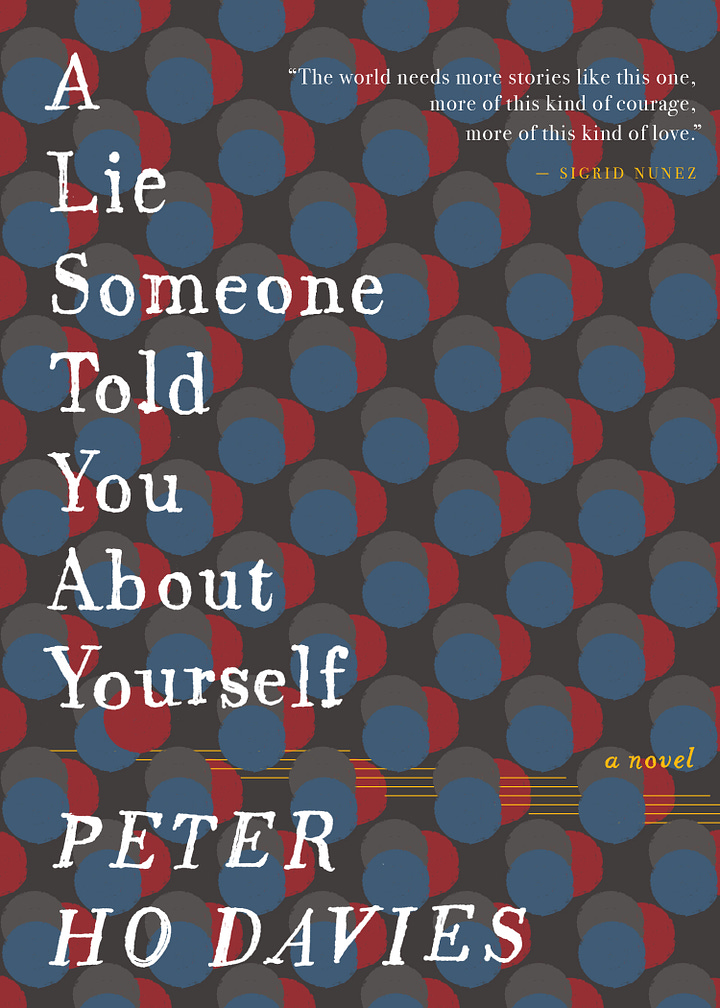
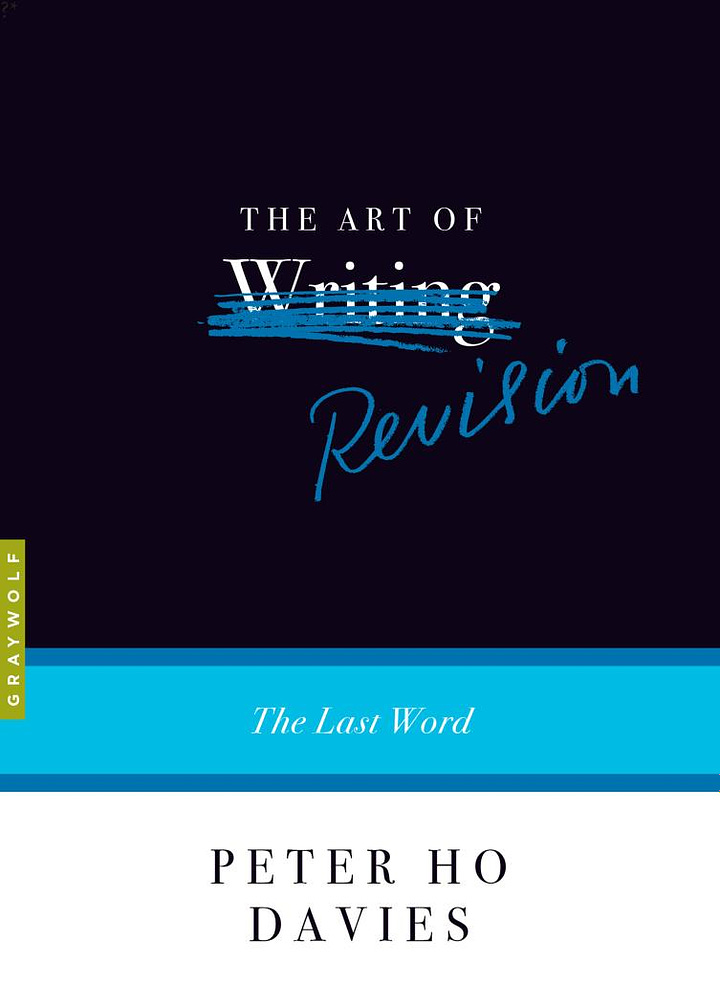
CH: Why do you think that is? What about you – or where you are in your life – has led to this incursion?
PHD: It surely derives in part from that old writerly chestnut “write what you know”, though I've always been interested in approaching characters via their jobs – an obsession that dates back to seeing my father lose his job and losing some sense of his self in the process. A Lie Someone Told You About Yourself is also an autofiction — somewhere in that uncanny valley between memoir and novel — so it seemed natural that the main character should share parts of my work life, especially in its writerly/teacherly aspects. Standard disclaimer: parts are true, but the whole is a fiction.
CH: I’m not sure every reader will be familiar with the term “autofiction”.
PHD: Autofiction is an evolving genre so can be tricky to define, but one distinction I'd make between it and more traditional autobiographical fiction is that it's often self-conscious, aware of itself as written. The term naturally makes us think of a mash-up of fiction and autobiography, but autofiction often includes a note of meta-fiction, too. As for the craft book, that inevitably sprung from my teaching life...I guess it means I've been doing it long enough to have a – short! – book's worth of wisdom.
CH: You’re British-born; your father is Welsh by birth, your mother Malaysian. But you moved to the United States some thirty years ago now, I think. Tell me, what motivated that decision at the time? But more, three decades later, with the perspective and wisdom that age brings, what do you think the real reason was you moved to the States?
PHD: The practical reason for coming to the U.S., as hinted at earlier, is just that there were many more places to study creative writing - and more places offering some financial support to do so. But the decision was probably shaped by other factors, too, not least the appeal of U.S. culture — I'd grown up on U.S. books, TV, film — and the excitement of travel. I'd never been to the U.S. before coming to grad school, and I figured even if writing didn't work out it'd be an interesting experience to live here. It probably didn't hurt, either, that I found out I'd be accepted to Boston University the same day in 1992 that the Tories and John Major won re-election! Back then it seemed a good time to be getting out of the UK.
Of course, deciding to come to the U.S. and deciding to stay here are different things. Initially, I figured it would just be for the year of the program, and even after I met my future wife in the U.S., we still thought we might move back to the U.K. until a series of lucky breaks — prizes, fellowships, teaching gigs, selling a book — gradually made it possible to imagine making a longer life here. Though, it still took me until 2016 to decide to become a US citizen, mostly because I wanted to vote in 2020.
The irony is that having to leave [the U.K. to] reimagine myself as a writer, a lot of my early work was set in Britain. The distance surely provided a new perspective on home, an experience common to expatriate and exiled writers.
CH: You qualified your answer by calling it “the practical reason”. You don’t think that was the real reason?
PDH: While I'd like to think all the above are "real", a subtextual reason is probably that coming to the U.S. allowed me to reinvent myself as a writer, imagine myself as that, far from the doubtful eyes of family and friends in the U.K. Of course, the doubts I'm attributing to them were a projection of my own insecurity. I said something like this in an interview with The Guardian a few years back which they headlined: "Could I have become a writer if I’d stayed in Britain?" which came across like a bit of a diss to Britain, which was not my intention. The irony is that having to leave to reimagine myself as a writer a lot of my early work was set in Britain, most notably my first novel The Welsh Girl. The distance surely provided a new perspective on home, an experience common to expatriate and exiled writers.
CH: I find it fascinating that you referred to the real reason as “subtextual”, which is a very literary description as opposed to say, describing your motivation as “unconscious”. I do this often myself, referring to my past – or during interviews like these, talking about other people’s pasts – as “back stories”. Maybe storytellers inevitably begin to think of all lives as stories, which might help to explain why so many of us begin to center ourselves in some form or another in our work.
PHD: All lives are stories, at least as recollected. They don't always feel like stories as we live them, but the way we recall them, retell them - these are the beginnings of editing and revising experience to make sense of it. I'm curious about your journey in this respect over the last twenty years. Among other things you’ve become something of an expat writer yourself, working in the U.S. and U.K. and now Australia, so I'm curious if and how those moves have changed your writing?
All lives are stories, at least as recollected. They don't always feel like stories as we live them, but the way we recall them, retell them - these are the beginnings of editing and revising experience to make sense of it.
CH: That’s a good question. I dwell on this a lot, because self-reflection has to be such a part of our lives – growth, evolution, editing our stories as we go along to bring it back to your Art of Revision. My life, how I see it — understand it, explain it — keeps changing. I think the biggest impact on my writing was this sense of becoming unshackled from Hollywood and how it expects stories to be told. I make “Hollywood” sound monolithic, a force of nature of some kind, but it really is in so many ways. In the U.K., my reps made me feel as if I could do anything and, in hindsight, it led me to do just that. I stopped saying “one day” and just started doing it – including shifting a significant amount of my creative energy to fiction from screenwriting. The fact that my parents had died or, in my father’s case, was struggling to hold on to life and, outside the windows, Brexit was tearing the U.K. apart and Trump the same in the U.S.…I had a lot to work through, questions I needed to give shape and explore, that Hollywood would have refused to even allow me to contemplate. I guess you could say, writing Psalms for the End of the World broke the dam open. It’s a blessing and a curse, because now I struggle to find the same joy I once did in writing films or TV series I don’t find deeply personal, even autobiographical. It’s hard enough making a living as an artist without alienating yourself from commercial opportunities. I’m envious of the role of teaching in your life because it affords you the security to create on your own terms.
PHD: That's fascinating and illustrates something that I thought about a lot while working on my revision book. We naturally tend to think of writers revising their books or screenplays, but there's also a sense of us writers being revised by our own work, and in response to the times we live through, whether those are life changes like losing a parent, or socio-political developments around us.
We naturally tend to think of writers revising their books or screenplays, but there's also a sense of us writers being revised by our own work.
As for the challenges of making a living, you're exactly right to say teaching provides me some space to create on my own terms. Most teachers of writing, myself included, grouse from time to time about teaching taking time away from their writing - and I suppose in any given busy semester that's likely. But as the years have gone by, I've come to really appreciate the way my steady teaching gig has bought me time, not just to write my books, but to get them right - at least by my own lights. I'm a big fan of Flaubert's line that "talent is long patience," and the steady job has afforded me that patience.
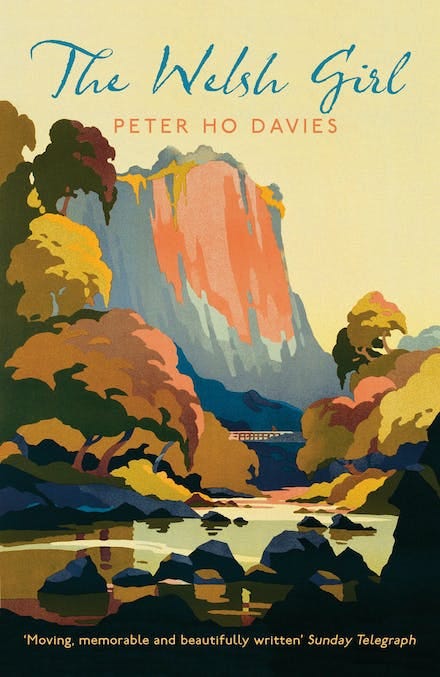
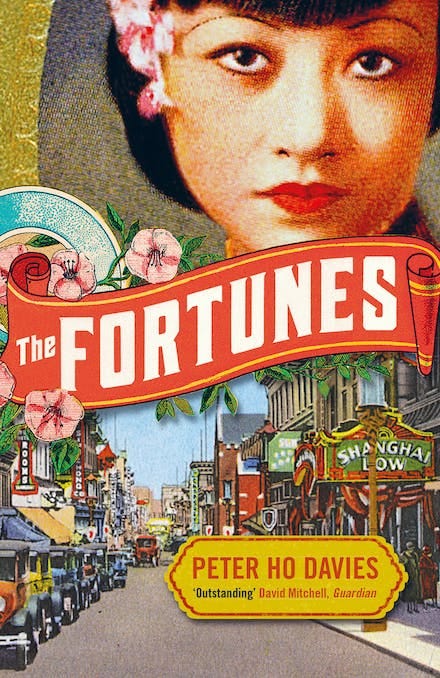
CH: The autofiction of A Lie Someone Told You About Yourself aside, your novels as a whole feel, at least from my perspective, very autobiographical. Not necessarily in hard facts, but emotionally, even existentially. I haven’t read enough of your short fiction in the past decade to include it, but I’m going to assume this remains true of it, too. Can you imagine – or even, have you even seriously contemplated – stories more divorced from your own lived experiences? The Fortunes seems to scratch that urge, branching into the past, but even then, it's still about being Chinese in America in some way or another, something a part of your identity knows quite a lot about.
PHD: They're all emotionally autobiographical, I think, which might simply be to say that I have a personal stake in each of them, but a lot of them are fairly far flung from my own personal experience. The Welsh Girl is set in WWII, parts of The Fortunes in the 1870's, and 1930's, etcetera, and before those books I have stories about everything from Butch and Sundance to alien abduction - my own love of films and TV shows through those latter examples.
That said, there is a long-standing vein in my work that's more directly autobiographical — always fiction, never quite memoir because I value the "cover" fiction provides — that stretches all the way back to my first published story. That was written at eighteen, published at twenty-one and touches on my grandmother's descent into dementia. I'm not claiming it was a great story, but it — to borrow your phrase — broke a dam open in me. I'd been writing bad SF through my teens, and that story about my grandmother was the first story I felt a real emotional power in. That story literally changed the course of my life. I was majoring in physics at college at the time — I was good at exams and math, but had no real talent for science — and that story reoriented my ambitions. Not, funnily enough, when it was eventually published, but a couple of years before that when I got a one-word rejection letter — "possibilities" — from an editor I admired. Talk about the power of words! That one word, barely legible in a hand-written scrawl, set me on my current path. I sensed those possibilities, I wanted to pursue them and that note did for me what all writers need often over and over: it gave me permission.
I got a one-word rejection letter — "possibilities" — from an editor I admired. That one word, barely legible in a hand-written scrawl, set me on my current path.
CH: I think it’s fair to say your creative writing seminar — or rather you — played that role for me. While writing had come easily for me, at least easier than it does for most people, I’d come from a very working-class background. Nobody had any relationship with the arts outside of considering it the stuff of hobbies. I’d read one of your novels by then and several short stories. I had terrible admiration for your writing, and the fact that you encouraged me in any way was a necessary part of my growth at that point. I don’t think I would’ve abandoned pursuing the arts in any way, but that permission you gave me, to truly believe I could do this, steeled me against self-doubt that might’ve slowed me down.
PHD: That note about class really resonates with me, even though my background is pretty solidly middle class. When I was growing up in the U.K., the late Martin Amis was probably the most famous young writer there, but since his father, Kinglsley Amis, was one of the most famous older writers in the country, it seemed to me somehow that writing was a "line" you had to be born into - not unlike the Royal family. At the very least, you probably needed to be from London, not Coventry, the provincial city I grew up in. This, even though it has a literary heritage of its own; Middlemarch is set there, Shakespeare's Stratford is thirty minutes away, Philip Larkin went to my high school, etcetera. One of the things that I still love about teaching creative writing is that it gives so many people a path to at least try to write. I don't want to overstate this — I teach in higher ed, economic access to which is by no means a given — but there's some modest "democratization" of art in that.
CH: We’re nearing the end of our conversation. I want to say, one of the reasons I wanted to have this conversation with you is because I’m curious about the role being a teacher has had on your work. Earlier I referenced how talking about your own art — your theories on craft, how you write — can actually give shape to things otherwise nebulous…but of course, becoming aware of the magic, in some way, can make you more self-conscious. Teaching isn’t a one-way transaction either. It’s a conversation. Your students inevitably challenge you, I imagine, forcing you to grow – maybe not dissimilar to how our children also challenge us. Do you think you would be the author you are today had you not become a creative writing instructor?
PHD: I suppose students in many/most fields challenge their teachers — it's a natural result of generational change, in part, which is where your comparison to our children comes in — but it seems especially important and essential for writers to do so. We want — and often need — writers, and artists in general, to be questioning, oppositional, iconoclastic etcetera. All of which is to say that I hope, expect, and even encourage students to push back. I have my ideas, my aesthetic, of course, but they don't have to go along with it. Indeed, they sometimes sharpen their own aesthetic in opposition as much as in agreement. It would be easy to take disagreement personally, as a kind of rejection of the teacher or his/her authority, but I remember being a "frictional" student myself and learning a lot from teachers I disagreed with because they obliged me to articulate that disagreement. The way I put this to my own students is that we can be influenced by things we love and admire — we gravitate towards them — but we can also be influenced by what we resist, we move against those things. After all, every writer at heart feels that somewhere on those vast bookshelves of the world is a book — or several — that they can do better than, or a gap where their own book belongs.
CH: Every writer.
We can be influenced by things we love and admire — we gravitate towards them — but we can also be influenced by what we resist, we move against those things.
PHD: Luckily, a workshop is a great space for this kind of disagreement. Twelve or fifteen folks just won't all agree about a particular work, and that's as it should be. Of course, you need to create a space of respectful disagreement, and that I think comes from taking young writers seriously – sometimes more seriously than they take themselves. I might question a particular choice in a story, but I hope I never question their right to be a writer. In case you're wondering, by the way, I seem to recall you were also a "frictional" student — passionately, but respectfully — and I hope I welcomed that. In a way, students like that are some of the most fun to teach - you can really push them, knowing they can take it. But I'd be curious if you recall it this way?
CH: I do, and I’m actually incredibly happy to hear you describe me in the same terms as you’ve used to describe yourself. I might’ve said “oppositional”, which was, I think, largely because I was slightly older than the other students and, in most cases, had written a great deal more. I didn’t feel I had the time to wait for other students to work up the courage to really critique my work. I had to poke at them a bit, maybe get them a bit agitated with me, so they’d really go at what I was doing and maybe say something brutally honest. I didn’t really mind people tearing apart my work if it helped me grow. What I did mind were students who didn’t seem to take the writing as seriously as I did, and that was my fault – because I should’ve known not all of them were as committed to becoming professional writers as I was. As for whether or not you welcomed that, I always thought you respected it, yes.
PHD: It's probably a defense mechanism of a kind to not take oneself or one's work seriously, or at least to seem not to. It's a hedge against the vulnerability we all feel when sharing new work. I get that and sympathize with it to a degree - even as I try to coax people into taking more risks, owning their work more. Ultimately, there's probably a boldness, arrogance, ego — call it what you will — that all writers need. Even if it's not the most laudable trait — and it's nice not to show it too much in workshop or at the bar with fellow writers or in interviews — alone, at the desk, it keeps us going.

PHD (cont’d): Somewhere in back of all this are Harold Bloom's ideas of the anxiety of Influence and his thoughts about how living writers have to wrestle with the dead who've come before us. Bloom sees it as a kind of oedipal struggle, indeed. A teacher is also an influence — albeit living! — and somewhere beneath our polite collegial surface in class I suspect/expect my students think they can do better than me. It's not actually a competition, of course, but certainly several have sold better than me and won more prestigious prizes. I was recently on a longlist for a prize with three of my former students. In the end, none of us won, but being on that list together was a prize in itself.
CH: I can imagine.
PHD: We're talking about conversations here and what the students — hopefully — get out of those, but those conversations are a two-way street and they're often deeply inspiring to me, too. Not least, there's the sense that week after week I get the privilege of watching students display a kind of bravery - sharing work they care about and pressing on with it in the face of challenges. Like any writer, I can still feel stuck or stymied and seeing them persevering tends to buck me up.
There are mysteries of writing that are less mysterious to me than when I was starting out – when it all seemed pretty mysterious!
As you suggest, though, there's a kind of anxiety in your question, the fear that by analyzing and teaching we can somehow destroy the magic of creation. I know what you mean by that, but I think that anxiety does a disservice to the magic. There are mysteries of writing that are less mysterious to me than when I was starting out – when it all seemed pretty mysterious! But as those mysteries have fallen away, new ones — deeper ones maybe — have revealed themselves. It's magic all the way down, my friend. I talk about this, or something like it, in my revision book, actually.
CH: Maybe that’s a great place to end this conversation, given how we’ve talked at length about the past and how our own biographies have impacted our work and how we tell our stories. What does revision mean to you at this point in your life? It sounds like a craft question, but, like The Art of Revision, has more than a hint of the existential about it.
PHD: For me, at heart the revision process is one of understanding a story or novel better and better until — paradoxically , perhaps — I finally understand why I set out to write it in the first place. This is less "write what you know" than "write to know." But even the clearest understanding can reveal fundamental mystery. I'm reminded here of my undergraduate days as a physicist and the bamboozling conclusions of the uncertainty principle, or wave-particle duality, but in fiction, as in life, the basic uncertainty or duality of the human condition that we can be both good and bad, innocent and guilty – those apparent contradictions contained in a single heart – remain intractably and infinitely mysterious to me.
CH: Beautiful, Peter. Thank you for this conversation and the part you played in my own life as an artist.
PHD: Really appreciate the questions, Cole. Thrilled to see the career you've forged for yourself and where it leads next. Not sure if I told you this, by the way, but I showed my last undergrad workshop — the folks now sitting where you used to sit — the galleys of your novel by way of inspiration, so now you're playing a part in giving them permission to dream.
CH: I’m going to let the thought of that get me through the next several rounds of edits on my next book. Thank you again.
You can learn more about Peter Ho Davies and order his books at his website.
If this article added anything to your life but you’re not up for a paid subscription, please consider buying me a “coffee” so I can keep as much of this newsletter free as possible for the dreamers who couldn’t afford it otherwise.
PSALMS FOR THE END OF THE WORLD is out now from Headline Books, Hachette Australia, and more. You can order it here wherever you are in the world:




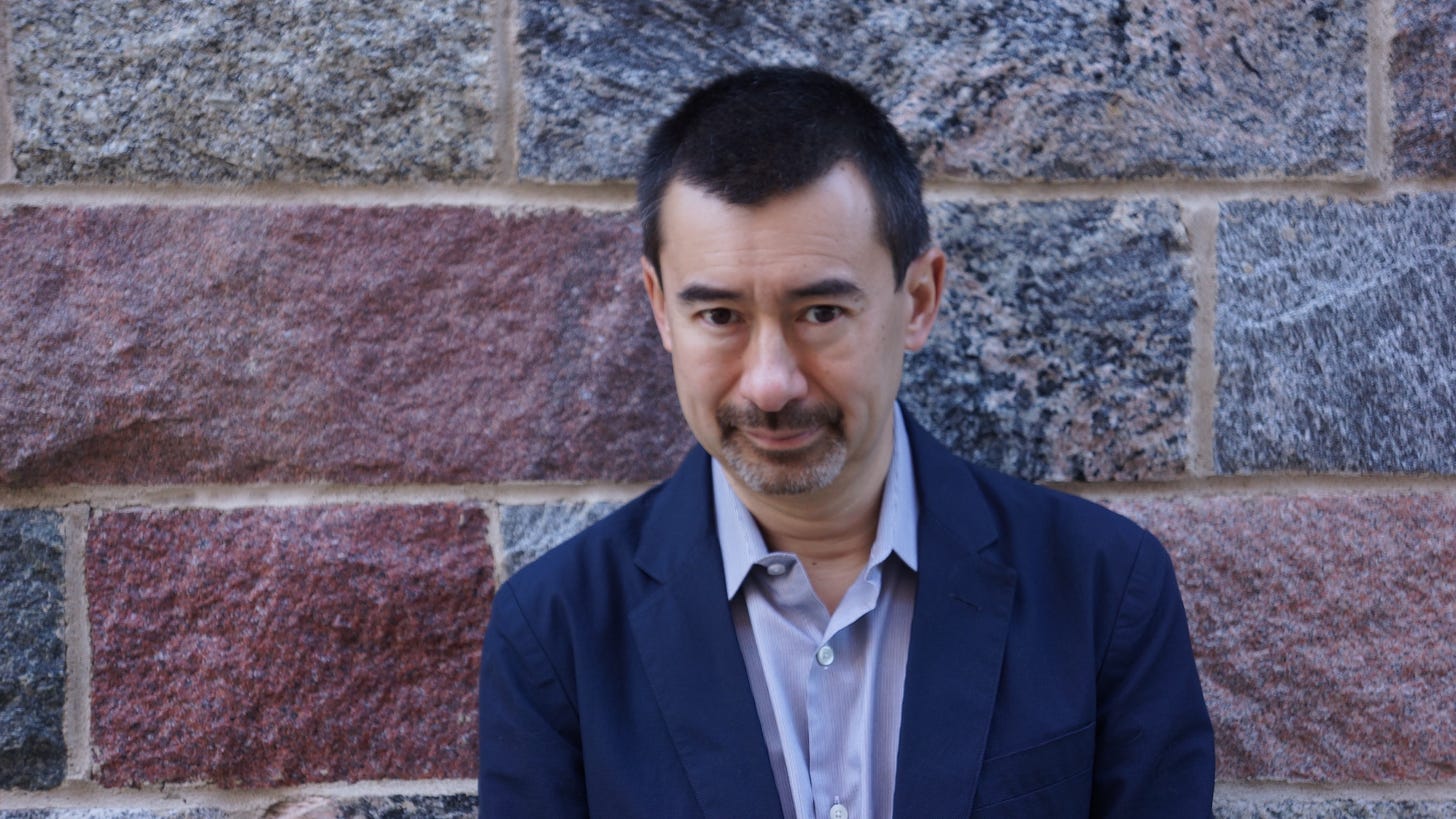
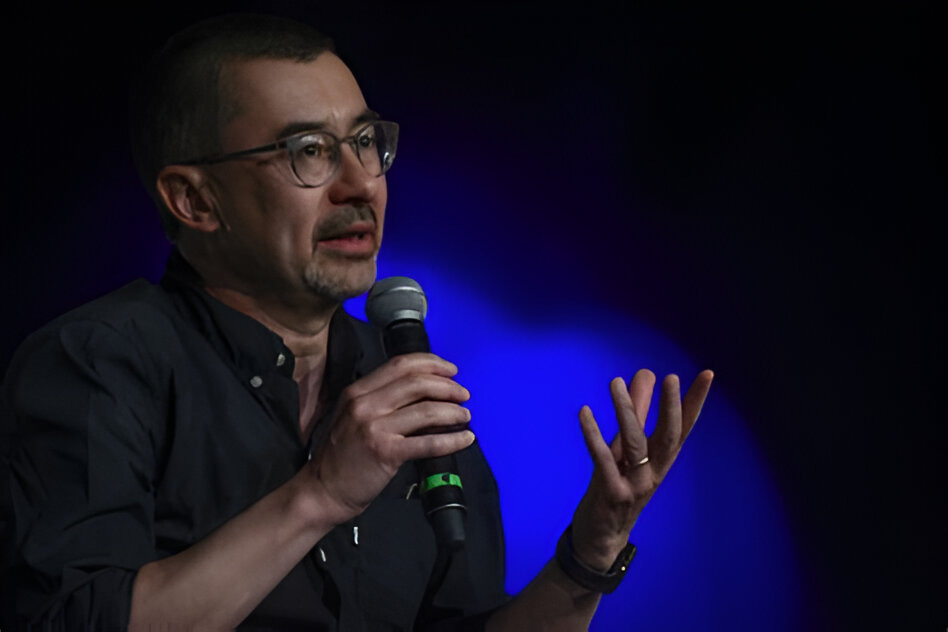
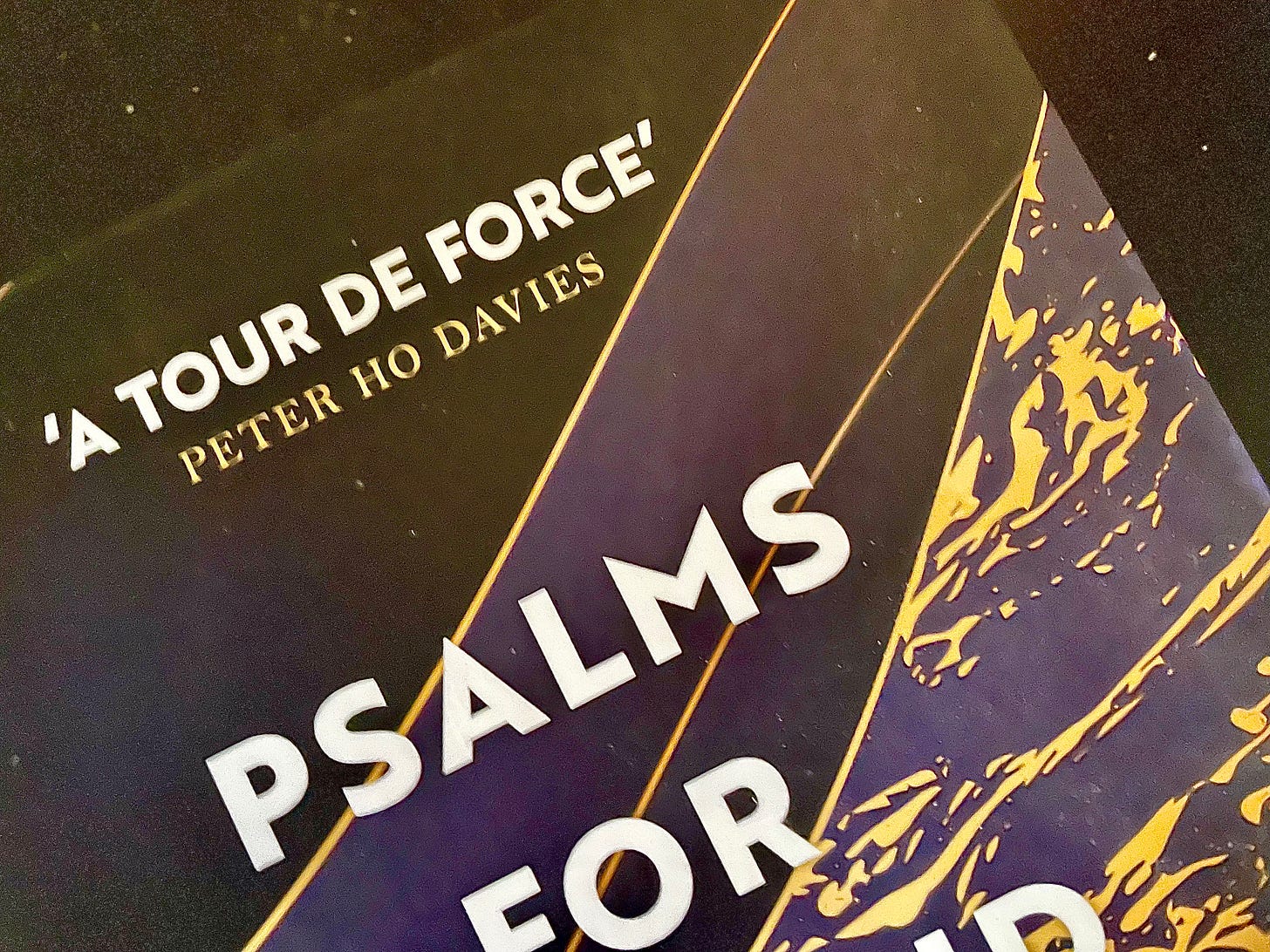
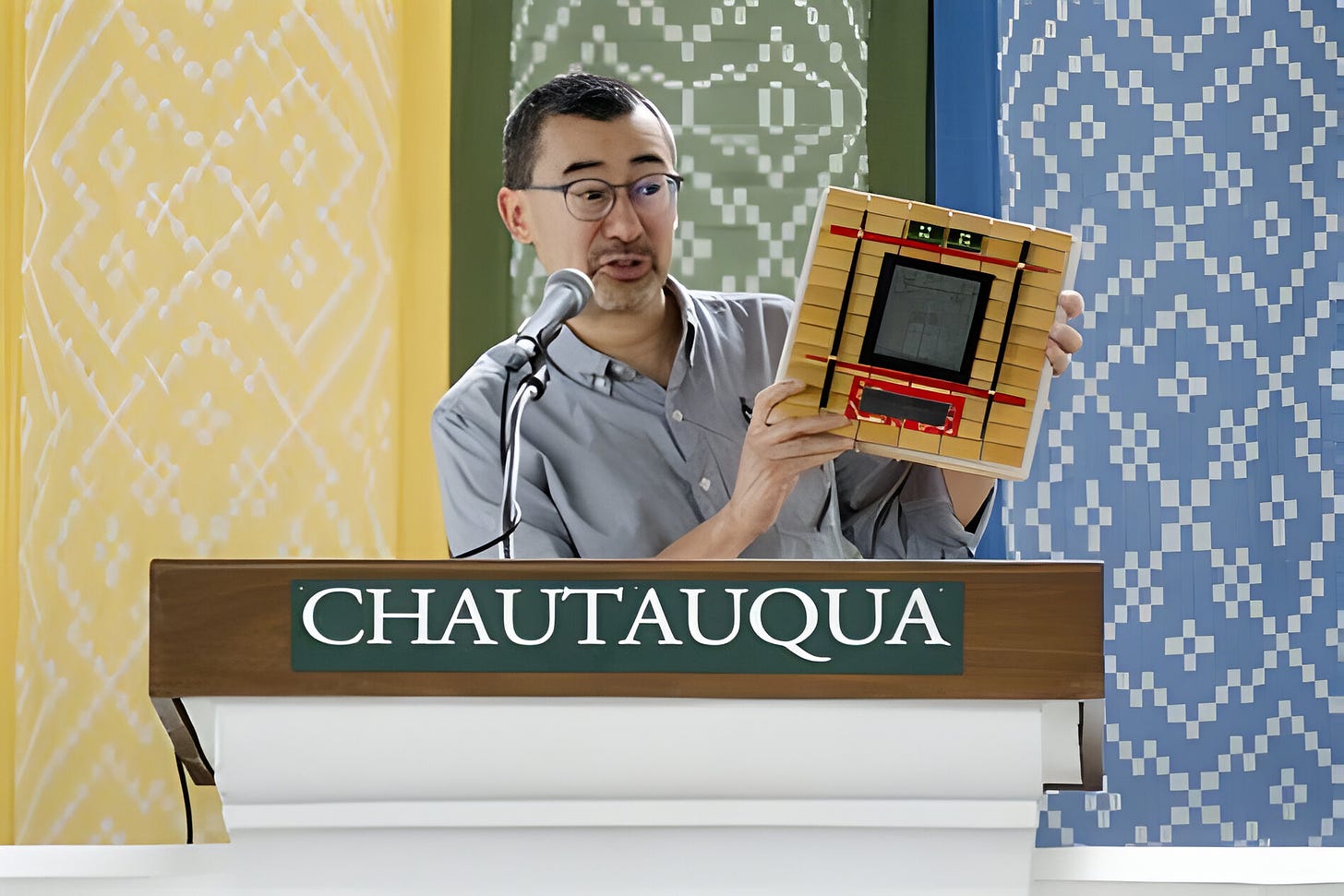

That was a beautiful conversation, and great for me as a writer. "Write to know" will stay with me I think.